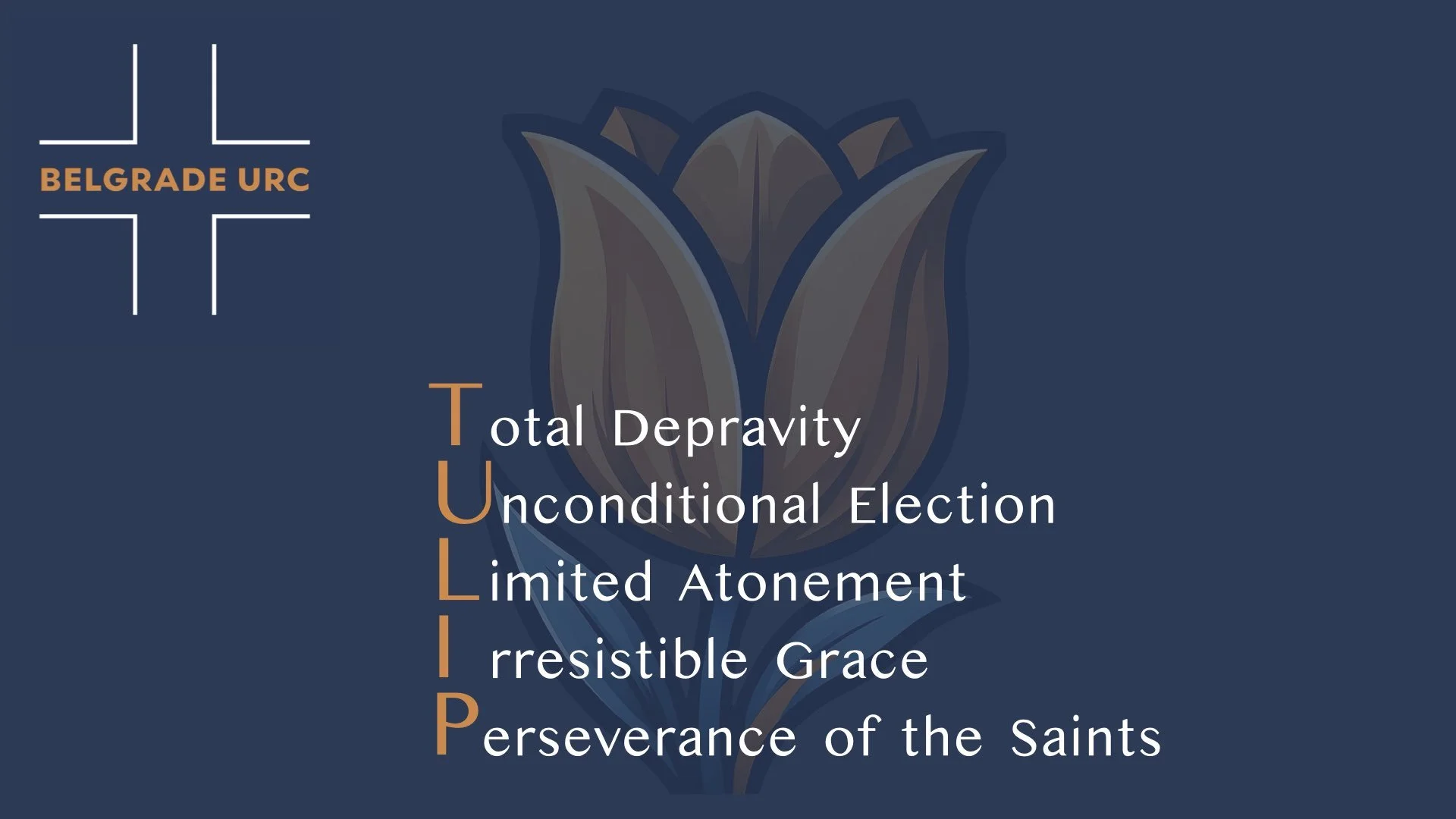Worship 10 am & 6 pm
Belgrade United Reformed Church
17333 Frontage Road
Belgrade, MT 59714

Persevere in God's Preservation (1 Peter 1:3-9; COD Head 5)
The Christian life is not easy sailing, but a journey of perseverance upheld by God’s preserving power. Anchored in Christ, refined through trials, and guarded by God’s strength, believers press forward with confidence, knowing their inheritance is secure and their Savior faithfully preserves them.

God's Myrtle or Persia's Star? (Esther 2:1-18)
The Book of Esther shows how God works even in silence. From King Xerxes’ pride to Esther’s rise, the story reveals His providence through unexpected heroes. Even in exile, God protects His people, fulfilling His promises through the seemingly weak. This week we consider divine sovereignty, human ambition, and faithful courage in the face of uncertainty.

Intro to Esther: King of Kings? Or King Headache? (Esther 1:1-22)
The Book of Esther is more than a heroic tale—it's divine satire revealing God's faithfulness through imperfect people. From King Xerxes’ pompous vanity to Queen Vashti’s principled defiance, the story exposes human weakness while highlighting God’s sovereign control. Even in exile, when His people compromise and stumble, God orchestrates events to fulfill His promises, demonstrating that true deliverance comes not from human heroes, but from the Lord Himself.

Called to Willingly Obey (Philippians 2:12-18; COD Head 3, 4 RE 6-9)
This post explores Philippians 2:12–13 and the Canons of Dort, showing that salvation and obedience flow from God’s transforming grace. Grace doesn’t just offer help—it renews the heart, empowering believers to live faithfully in Christ. We work because God works in us, producing joy‑filled obedience.

God's Family: Stranger Danger (Matthew 2:1-12)
In Matthew’s Gospel, we find two kinds of people in God’s kingdom. There are those inside and there are those outside the covenant line. The surprising truth is that the outsiders, represented by the Magi, are the ones who recognize and worship Christ, while the insiders, represented by Herod and Jerusalem, miss His coming. This message challenges us to consider where true belonging in God’s family comes from—not heritage or status, but faith in Jesus Christ. Through the story of the Magi, Matthew reveals that Christ came to bring even the farthest outsiders into His family, transforming strangers into beloved sons and daughters of God.

For Whom Does Christ Pray? (John 17:4, 9, 20-21; COD 2)
This sermon explores the doctrine of limited atonement through John 17, showing that Christ’s death is not a vague, potential redemption but a finished work for a particular people the Father has given Him. Rather than fueling elitism, this truth humbles believers: faith does not save us; Christ saves. Faith is the Spirit’s gift that compels us to cling to Him to receive all Christ’s distinct benefits. Christ’s high priestly prayer reveals His heart. Christ prays for his people. Christ desires eternal fellowship with the people that God has given to Christ. This does not make us complacent, but we live in the confidence that Christ’s work will complete his intended result.

God’s Family: Joseph Son of David (Matthew 1:17-25)
This sermon reflects on how God faithfully works through broken family lines, centering on Joseph as the quiet, righteous link between David’s promises and Christ’s birth. Matthew’s genealogy reveals that God does not need perfect people, but uses flawed, ordinary sinners to bring the Messiah into the world. Joseph’s obedience in taking Mary as his wife, bearing public shame, and naming the child “Jesus, Yahweh saves”, secures Jesus’ legal place in David’s line and displays what true righteousness is: humble trust in God’s redemptive plan. Through Emmanuel, “God with us,” God triumphs over human sin, fulfills His covenant, and graciously calls us into His family, assuring believers that His promises will never fall flat.

Tragic and Glorious Will (Luke 23:26-56)
The cross of Christ, often viewed as a sanctified symbol, exposes humanity’s sinfulness and the need for redemption. Luke’s account shows the irony and glory of the gospel—from Simon carrying the cross, to the repentant thief, to the centurion and Joseph of Arimathea—revealing that Christ’s death is not failure but the completion of His redemptive work.

Introduction to The Canons of Dordt: Five Points of Calvinism
This week we began a series on the Canons of Dort, exploring the five points of Calvinism. These doctrines—Total Depravity, Unconditional Election, Limited Atonement, Irresistible Grace, and Perseverance of the Saints—show God’s sovereign, transforming grace. Far from prideful or fatalistic, they call believers to humility, worship, and confidence in God’s faithful work.

Kangaroo Court (2) (Luke 23:1-25)
When Jesus stands before Pilate and Herod, both rulers find Him innocent, yet the crowd demands the release of Barabbas, the rebel. Their choice exposes humanity’s deep tendency to prefer earthly power over God's redemption.

Satan’s Sustenance (I Peter 5:8; LD 52)
Peter reminds us that the Christian life is lived on a battlefield. The devil prowls like a roaring lion, our flesh is weak, and the world pulls us away from God. Yet Christ calls us to be sober-minded, watchful, and firm in faith. This reflection on the Heidelberg Catechism’s final petition shows how prayer and dependence on Christ secure our victory when temptation comes.

The Kangaroo Court (Luke 22:54-71)
Christ’s kingdom turns the world upside down—not through power or fear, but through peace. As Peter’s failure and Christ’s silence unfold in Luke’s Gospel, we see that true strength is found not in human resolve, but in the Savior’s submission. The King who was mocked and beaten was already winning the greatest battle of all—redeeming sinners and restoring peace with God.

What is Forgiveness? (LD 51; Col. 3:12-17)
Forgiveness is never simple. Scripture calls us to release offenses while exercising wisdom and setting healthy boundaries. Rooted in Christ’s sacrifice, true forgiveness bears a cost—it lifts the burden of sin without ignoring justice. As we forgive others, we reflect God’s grace and live out our shared identity in Christ.

The Sword's Snare (Luke 22:39-53)
In a world that either exaggerates or ignores the devil’s influence, this message calls believers to recognize the unseen battle of spiritual warfare. True victory isn’t found in self-reliance but in humble prayer and dependence on Christ, who conquered the enemy through His suffering and resurrection.

Why the Swords? (Luke 22:31-38)
Christ tells us to be ready in this age. However, it is not with swords in our hands, but rather with faith that reaches the resurrected Christ. The real battle isn’t fought with steel, but with prayer, perseverance, and trust in the One who intercedes for us, guaranteeing that we will be preserved.

Twas the Night Before Passover (Luke 22:14-30)
In this sermon, we explore the profound meaning behind Christ’s celebration of the Passover, contrasting it with the familiar but sentimental imagery of "’Twas the Night Before Christmas." Christ’s Passover reveals a radical, costly redemption that goes far beyond simple reward or punishment. It challenges us to recognize our unworthiness and embrace the violent yet life-giving sacrifice of our Savior.
Far from a mere memorial, the Lord’s Supper invites us into ongoing communion with the living Christ, who nourishes and sustains us through his broken body and shed blood. This meal is a powerful reminder that true greatness in God’s kingdom comes not from status or ambition but from humble service and reliance on grace.

Preparing the Passover Lamb (Luke 22:1-13)
Throughout Scripture, God’s sovereignty is clear: even amid human failure, sin, and betrayal, His redemptive plan unfolds perfectly. From Adam and Eve to Abraham, from Israel’s deliverance from Egypt to Christ’s passion, God works through unexpected circumstances to accomplish His purpose. Though Christ faced conspiracies, betrayal, and chaos, He fulfilled His role as the Passover Lamb, submitting to the cross at the appointed time and securing redemption for His people. In Him, our sins are covered, our lives consecrated, and our identity and strength found. We need to be reminded that nothing surprises God, and all His promises are faithfully fulfilled.

Watch the Fig Tree (Luke 22:5-38)
Life with Christ is not promised to be easy, but we always need to see that our redemption is secure. Jesus warns us about deception, suffering, and the fleeting nature of earthly things, yet He calls us to discernment, endurance, and hope in Him. In a world of turmoil and false promises, our strength is found not in institutions or human effort, but in the risen Christ who preserves His people to the end.

Professing Jesus: The Apostle of Our Confession (Hebrews 3:1)
In the Reformed tradition, profession of faith is when a covenant child declares, “This faith is my faith.” It’s more than a one-time event because it’s a lifelong calling to daily confess Christ in both struggles and joys.
Hebrews points us to Jesus as both Apostle and High Priest. He is the one sent by the Father to confirm God’s promises. He is the High Priest as our mediator who secures God’s promises. Profession of faith is not only about standing before a congregation but about holding fast to Christ every day, trusting in our faithful Redeemer who is our shield and defender.

David’s Son, David’s Lord, and David’s Savior (Luke 20:41-21:4)
Christ challenges the religious leaders’ understanding of the Messiah, exposing their hypocrisy and exploitation of the vulnerable, particularly widows. He contrasts the widow’s sincere offering with the leaders’ self-serving actions, highlighting the importance of aligning with God’s purposes and prioritizing His will over self-advancement. Despite abuses, Christ encourages humility, self-denial, and faithful obedience, reminding believers of their ultimate hope in Him.

